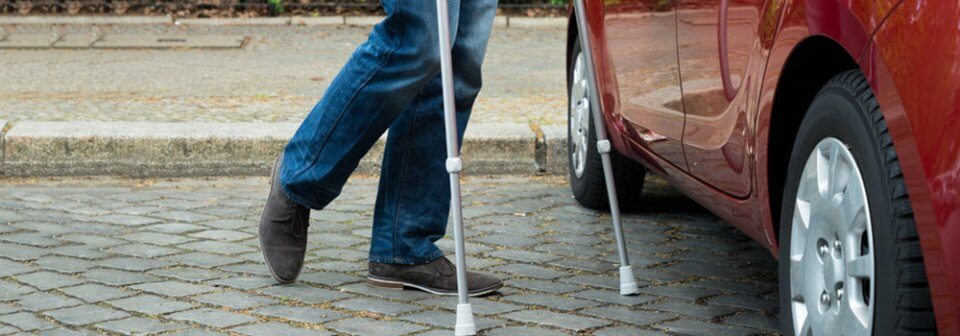
Car accidents are a serious matter, and understanding the different types of injuries that can result from them is essential. The National Highway Traffic Safety Administration (NHTSA) reports that the most common injuries resulting from car accidents are minor injuries such as bruises, cuts, and scrapes, but severe injuries such as head trauma and fractures are also possible.
It’s important to have information about these common car crash injuries and take necessary precautions to prevent them. Proper auto insurance coverage can also provide financial protection in the event of an accident. Let’s dive into the different types of car accident injuries and the best way to avoid them.
Physical Injuries
Car accidents can cause a wide range of physical injuries, from minor cuts and bruises to serious internal injuries that require immediate medical attention.
Some of the most common types of injuries that car accident victims may experience include:
- Traumatic Brain Injury (TBI): A serious injury resulting from a car crash that can cause brain damage and require immediate medical attention.
- Spinal Cord Injuries: Damage to the spinal cord due to a motor vehicle accident, which can lead to paralysis or long-term disabilities.
- Head Injuries: Various types of injuries to the head, including concussions, fractures, and internal bleeding, necessitating prompt medical treatment.
- Neck Injuries: Commonly caused by the impact of a car accident, neck injuries such as whiplash can result in pain and require ongoing medical care.
- Back Injuries: Injuries to the back, such as herniated discs or fractures, can cause severe pain and may require physical therapy or even surgery.
- Internal Injuries: Damage to internal organs, blood vessels, or tissues, often caused by the forceful impact of a car accident, necessitating immediate medical attention.
- Bone Fractures: Broken bones, such as those in the arms, legs, or ribs, are common car accident injuries that may require casts, surgeries, or rehabilitation.
- Soft Tissue Injuries: Damage to muscles, ligaments, or tendons, resulting in pain, swelling, or limited mobility, typically treated with physical therapy.
- Knee Injuries: The impact of a car crash can cause knee injuries, such as sprains, tears, or dislocations, which may require medical intervention or surgery.
- Penetrating Injuries: Injuries caused by sharp objects or shattered glass during a car accident that may result in deep cuts or puncture wounds, requiring immediate medical attention.
It’s essential to seek prompt treatment for any car accident injury and consult with medical professionals and personal injury lawyers to ensure proper care and address potential long-term consequences.
Emotional and Psychological Injuries
- Post-Traumatic Stress Disorder (PTSD): Auto accidents can trigger PTSD, causing individuals to experience flashbacks, nightmares, anxiety, and emotional distress.
- Emotional Trauma: The emotional impact of a car accident can result in depression, fear, anger, guilt, and a loss of interest in daily activities.
- Anxiety Disorders: Car collisions can lead to generalized anxiety disorder (GAD), panic disorder, and phobias related to driving or being in a vehicle.
- Psychological Distress: Individuals may suffer from psychological distress, including sleep disturbances, irritability, mood swings, and difficulty concentrating.
- Survivor’s Guilt: Those who survive fatal crashes may experience survivor’s guilt, feeling a sense of responsibility or remorse for the loss of others involved.
- Financial and Legal Stress: Dealing with medical expenses, insurance claims, and legal proceedings adds additional emotional strain and anxiety.
- Impact on Relationships: Car accidents can strain relationships with family members and loved ones due to emotional distress, changes in behavior, and the need for support during the recovery process.
- Fear of Driving: Some individuals develop a fear of driving or experience driving-related phobias following a car accident.
- Loss of Confidence: Auto accidents can lead to a loss of self-confidence and a sense of vulnerability, making individuals hesitant to get back on the road.
- Need for Support: Seeking professional help, such as therapy or counseling, can be essential in addressing and managing the emotional and psychological injuries resulting from a car accident.
It’s important to consult with doctors, attorneys, and seek legal advice to make informed decisions during this challenging time.
Factors Contributing to Car Accident Injuries
Car accident injuries result from various contributing factors, including distracted driving, impaired driving, speeding, and non-driving situations. By recognizing these factors and taking necessary precautions, we can mitigate the risk of accidents and promote road safety:
Distracted Driving
Distracted driving is a major factor in car accidents. Activities like texting, talking on the phone, eating, or using in-car technologies divert the driver’s attention from the road and significantly increase the risk of accidents.
Even a momentary lapse in concentration can have severe consequences. It is important to prioritize focused and attentive driving, avoiding any distractions that can compromise safety.
Impaired Driving
Driving under the influence of alcohol, drugs, or certain medications poses a serious risk on the road. Impaired driving affects judgment, reaction time, and coordination, making it extremely dangerous.
It is essential to never operate a vehicle when impaired and to find alternative transportation options when necessary. This responsible decision can prevent accidents, injuries, and even save lives.
Speeding
Excessive speed is a leading cause of car accidents. Driving over the speed limit reduces the driver’s control over the vehicle, increases stopping distances, and magnifies the impact force during a collision. Speeding not only puts the speeding driver at risk but also endangers the lives of others on the road. Adhering to speed limits and adjusting driving speed according to road and weather conditions is crucial for maintaining safety and preventing accidents.
Non-Driving Situations
Car-related injuries can happen anytime, even without driving. Non-driving situations such as using an automotive jack, walking near traffic, back-over accidents, and incidents like hyperthermia and electrocution contribute to a significant number of injuries and fatalities each year.
It is important to be cautious, seek proper training, wear reflective clothing, check blind spots, and be aware of potential dangers to prevent such injuries. However, it’s worth noting that accidents occurring while your car is parked or immobile are generally not covered by auto insurance.
Tips for Preventing Car Accidents
However, if nothing else, the good news is that by prioritizing safety, people can significantly reduce the risk of car accidents and the resulting injuries.
- Wear seat belts: Always buckle up and ensure that all passengers are properly restrained, as seat belts significantly reduce the risk of injury in a car accident.
- Stay focused and attentive: Avoid distractions while driving, whether in the garage, driveway, or parking lot, and keep your full attention on the road.
- Maintain your vehicle: Regularly check your car’s brakes, tires, lights, and other essential components to ensure they are in good working condition, reducing the chances of mechanical failures.
- Obey traffic laws: Follow speed limits, traffic signals, and other rules of the road to promote safe driving practices and minimize the risk of accidents.
Taking these precautions is an important decision that can protect your health, avoid financial losses, and prevent the need for extensive medical bills.
You may also want to check to make sure you’re getting the best rate on your auto insurance. Why not get a free auto insurance quote today?
If you feel that you may be paying too much for your car insurance, call Freeway Insurance today at (800) 777-5620. We have knowledgeable agents who can answer all of your insurance related questions and give you a quote based on your needs, driving history, and budget. Freeway provides quality insurance at affordable rates for every driver. Call today or request your free quote online.



